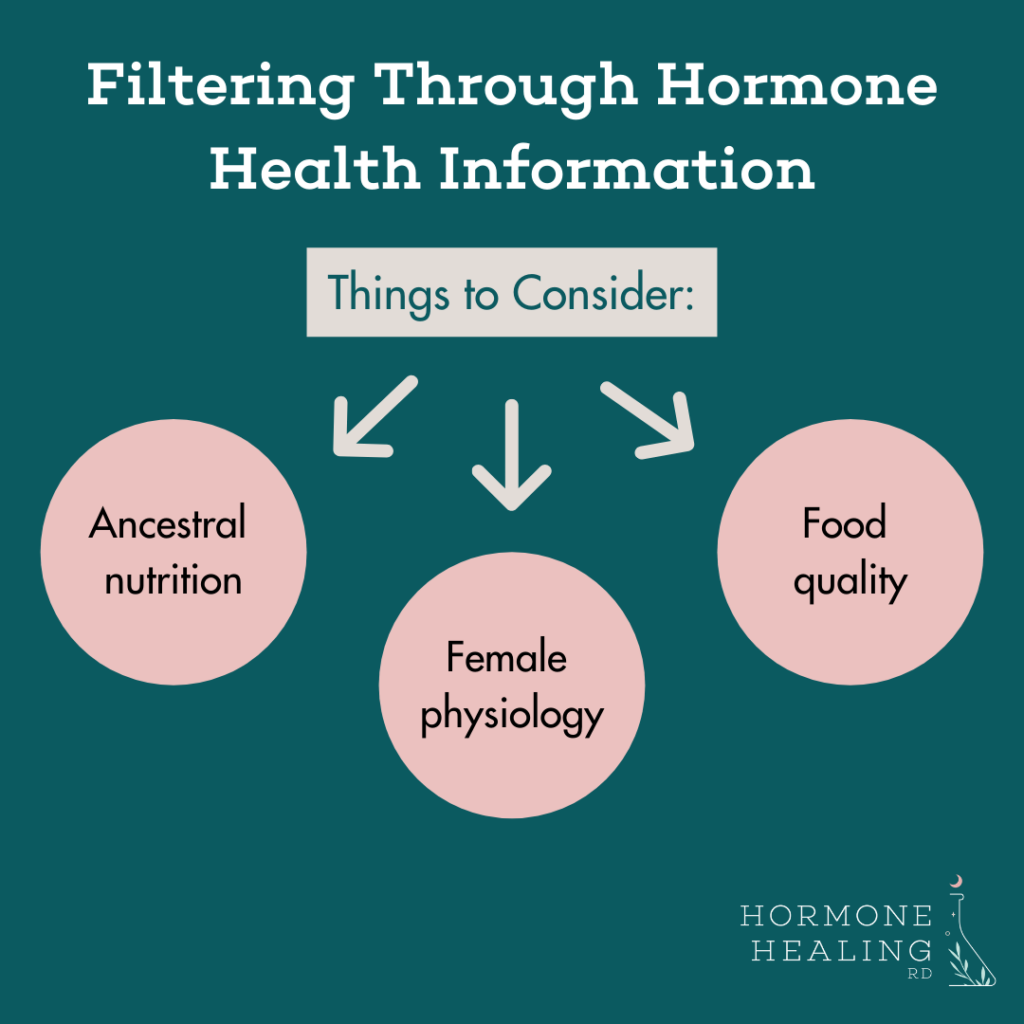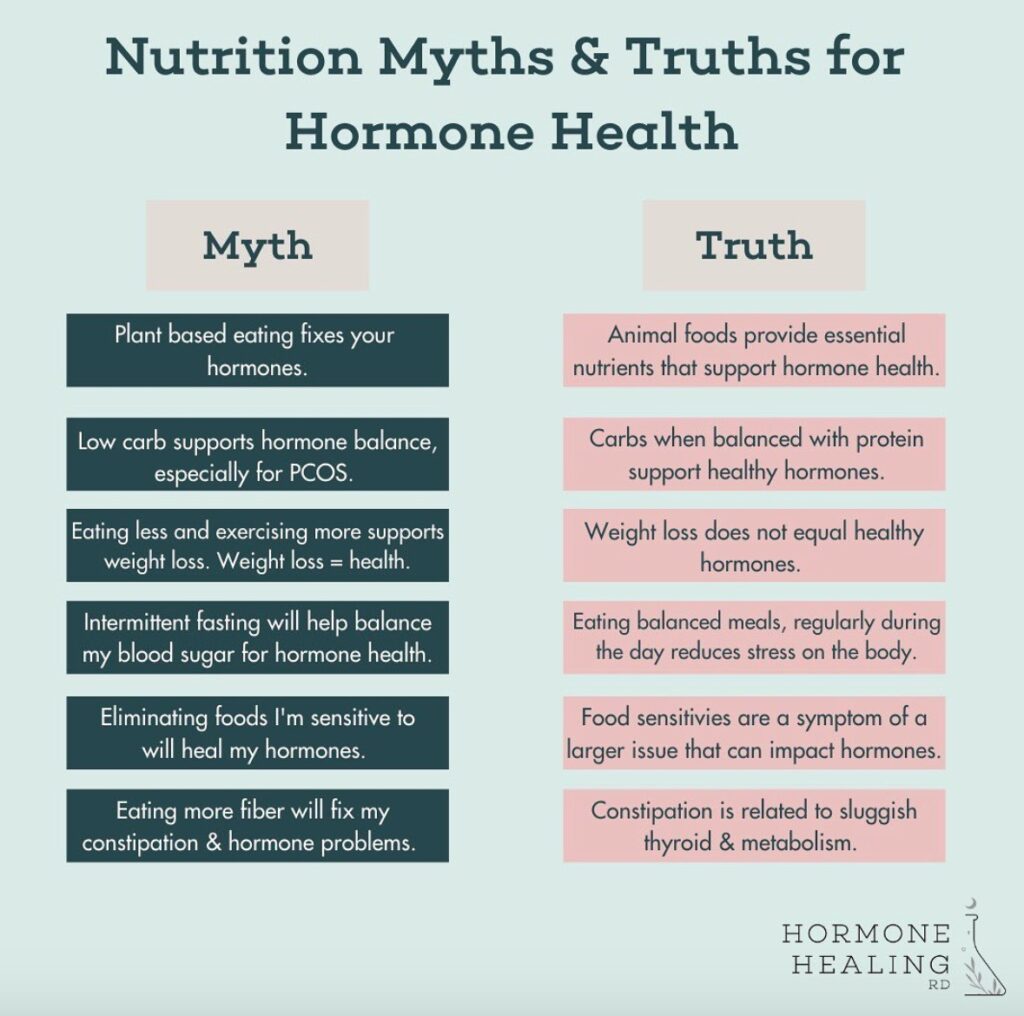Do you consider yourself up-to-date on the latest nutrition trends? Does the searching for nutrition information leave you looking confused? Trust me; you are not alone. With the worldwide web literally at our fingertips, we have access to an overwhelming amount of information. One source says one thing, while another says something completely different. Our hormones regulate so many of our bodily functions, and caring for them is critical. When it comes to our hormone health, it is extremely important to have the correct information. With that being said, today, I want to bust a few myths concerning the nutritional management of our hormone health.
How can you filter out the incorrect information?
Most of us need to unlearn everything we have been taught about nutrition for hormone health. Because there is a ton of conflicting information out there, this can be hard to do. I like to use a filter to process different ideas. So, forget everything you know (or think you know) about nutrition for hormone health to heal your hormones. By processing information through a filter, you can quickly rule out diet trends that will not help you in the long run. The filter is a combination of:

What are the nutrition myths and truths concerning hormone health?
Myth #1- Plant-based eating fixes your hormone health.
Truth- plants do not provide all of the essential nutrients we need for healthy hormones. Animal foods contain a higher amount of easier to absorb nutrients. Both plant and animal foods combined make up an optimal hormone healthy diet.
Myth #2- A low carb diet supports hormone balance, especially for PCOS.
Truth- When we process this through our filter, we know that our bodies run off glucose–without adequate glucose, we will take protein and fat and turn this into the fuel we need and run less efficiently. Learning to balance your meals with protein, fat, and carb supports our metabolism, thyroid, and blood sugar balancing, which is most important for hormone health and PCOS.
Myth #3- Weight loss = hormone health
Truth- We need to get healthy to lose weight, not the other way around. Weight loss is not always healthy. Weight loss puts the body in a catabolic state–we build hormones in an anabolic state.
Myth #4- Intermittent Fasting (IF) will help balance blood sugar and hormones.
Truth- IF acts as a stressor on the body and leads to higher levels of cortisol. For this reason, you feel more “alert” when fasting. IF leads to low progesterone and often high levels of estrogen in the long run.
Myth #5- Eliminating food sensitivities helps hormones.
Truth- Food sensitivities are a sign of a deeper issue–they are a symptom.
Myth #6- Eating more fiber will fix my constipation and hormone problems.
Truth- Constipation is a symptom of a sluggish thyroid and metabolism.

Why does a plant-based diet not fix your home health?
Plant-based diets leave out the most nutrient-dense and healing foods, which come from animal sources. There is a variety, and you do not have to eat all of them. I have had clients shift from entirely plant-based for starting to include things like eggs and bone broth, or collagen, and eventually working in some grass-fed dairy, then beef. They notice considerable changes in their energy and blood sugar balance, sleep patterns, and periods.
Why does a low carb diet not fix PCOS?
A diet low in carbohydrates will not fix insulin resistance, PCOS, or thyroid imbalances. The thyroid does that. Glucose is the number one fuel source for the body. Where do we get glucose?…carbohydrates. Why would we follow a diet that is going to limit the body’s preferred fuel source? The hormonal issue is typically not with glucose, but rather the food source. The oils in the food source (soybean oil, canola oil, sunflower oil, safflower oil) have polyunsaturated fatty acids (PUFAs), which can create more inflammation within the body. A fair amount of research states PUFAs lead to more insulin resistance than glucose or carbohydrates in general. Our brain uses 120g glucose daily. We use glucose to convert thyroid hormone in the liver.
Why will losing weight not heal your hormones?
We do not lose weight to get healthy; we get healthy to lose weight. Anyone can lose weight following a crazy restricted diet. What happens next? You gain it all right back, and sometimes even more than that. At this point, your metabolism wrecked. Have no fear; it is not permanent. Your metabolism will need some support.
Why does IF not balance your blood sugar and heal your hormones?
Intermittent fasting means that you are eating in shorter periods of the day. There are so many ways to do it. Some people skip breakfast; some only eat between 12-8 pm and some between 12-4 pm or 4-8 pm. I do not recommend IF for hormone health because when you are not eating, your blood drops, which alerts your body that you need more sugar. Your brain is then alerted of stress and tells your hypothalamus and pituitary gland to say to your adrenals to release cortisol. The message says you are stressed out and require glucose. The body’s response is to release stored glycogen from your liver to make glucose. You will also have an increase in cortisol. Individuals who utilize IF often say, “I feel so much better,” “I have so much energy,” “My head is much more clear.” Yes, that is because you are pumping cortisol through your body, which is stress. You want to reduce your body’s stress to make more progesterone to balance out estrogen levels for ovulation and healthier periods.
Why will the elimination of food sensitivities not heal your hormones?
The results of a food sensitivity test are an essential piece of information. However, food sensitivity is not the issue that is causing a disturbance in your gut. It is not what is causing added stress in your body. Instead, it is a symptom of a dysfunctional gut and stressed-out body. Several of my clients find that their bodies can now tolerate the foods they once gave up after working with me for months.
Why will consuming more fiber and water not fix my constipation and hormone problem?
Being conscious enough to make better food choices that incorporate more fiber and water is definitely not bad. The more critical issue is why you are constipated in the first place. What slows down your transit time? The answer is your metabolism and thyroid health. One of the most common symptoms of a sluggish thyroid is constipation. During constipation, everything is slowed down, including digestion and gut motility. Continuously adding more and more fiber may help in the short-term, but you will possibly get even more backed up and have more stress in the gut, or your digestion could be worse in the long-term. Instead, think about what you are eating. Ask yourself, “Am I eating foods that are easy to digest?” and “Am I eating lots of raw veggies?” If you are experiencing gut issues, ease up on your raw veggie intake to give the gut time to rest and try cooking them instead. If increased fiber helps you go, but it is not a good bowel movement, then the underlying cause for constipation is your metabolism or thyroid.
Hormone health can be a confusing topic. And even more confusing is what do you eat or not eat to have healthy hormones. With so much information available online, take some time to think about the information you read and apply the filter method to weed out incorrect information. Your hormone health depends on trustworthy information. For a step-by-step guide on optimizing your metabolism and healing your hormones, check out my Master Your Minerals Course. In it, we teach you how to interpret your own HTMA and build a hormone-healing protocol based on your unique results.
Photo by Magdalena Kula Manchee on Unsplash
